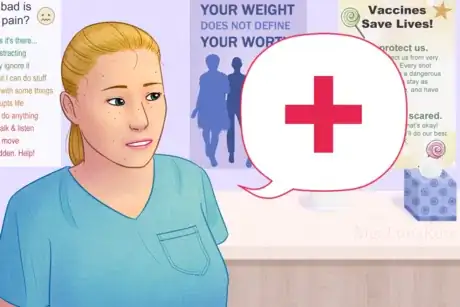This article was written by Luna Rose. Luna Rose is an autistic community member who specializes in writing and autism. She holds a degree in Informatics and has spoken at college events to improve understanding about disabilities. Luna Rose leads wikiHow's Autism Project.
There are 21 references cited in this article, which can be found at the bottom of the page.
This article has been viewed 18,637 times.
Handling arguments and difficult interactions can be tricky if you're autistic. From rude comments to arguments to creepy people, this wikiHow will help you handle a number of upsetting social situations.
Steps
Handling Arguments
-
1Recognize the importance of respect. Assertiveness in conflict means treating the other person with respect, and making it clear that you want to be respected too.[1]
-
2Keep in mind that aggression often stems from fear. People who act rudely may do this because they're feeling scared, lonely, or out of control. So they try to exert control, even if this means acting in unproductive and immature ways.
- This doesn't excuse bad behavior. But it can help you understand it, and feel less afraid of it.
Advertisement -
3Dodge topics that may lead to a pointless argument. If you have noticed patterns that emerge (political differences, people critiquing your love life, et cetera), it can help to nip it in the bud and change the direction of conversation.[2] [3] Try saying...
- "Thanks. I'll think about it."
- "Yeah, uh huh. So how was your day?"
- "I'm not interested in talking about that right now."
- "This isn't a debate I'm comfortable having. So, how is your work?"
- "Thanks, but I'm not looking for advice."
- "Please don't comment about my body/disability/political stance/relationship status. I don't like it."
- "This conversation is uncomfortable. Let's change the subject."
-
4Don't take the bait if someone is trying to provoke you. If someone starts insulting or demeaning you, they want you to fight back, so don't. It can help to label their underlying emotion, and talk about handling the situation productively.[4]
- "I see that you're angry. Is there anything I can help you with?"
- "Clearly you aren't satisfied with my work performance. Maybe we could talk about constructive strategies for making things better?"
-
5Stop a rant using a topic grab. A "topic grab" is when you find one of the things that the person mentions in a rant, and ask about it. This distracts them from their anger, and allows you to find something to connect with.[5]
- If the person is raving about how hard their family life is and they mention a spouse and children, you could ask how old the children are, or how their spouse is doing.
- If someone is complaining about how they are never appreciated at work, you could ask what their last project they did was, then empathize that it must have been difficult.
-
6Use verbal softeners instead of absolute terms. Words like "sometimes," "often," and "maybe" are usually received better than words like "always," "never," or "constantly."[6]
- "Perhaps you got bad information."
- "It's unlikely that I misfiled anything. I make a habit of checking twice. I don't think it's here."
- "I rarely use the microwave, and when I do, I usually put a napkin over my food to prevent spattering. I don't think I am the one who made the mess that you are angry about."
-
7Find common ground before disagreeing. This can defuse hostility by showing that you hear and agree with part of what someone is saying. Try to say "yes" before you say "no."
- "Yes, it's true that ________. However, ________."
- For example, "I know that Peta campaigns for animal rights, which I think is a fantastic cause. Unfortunately, they don't have a great track record. Their shelters have a very high kill rate, and I don't support that."
-
8Offer a face-saving out if the other person was wrong. If the other party is at risk for embarrassment, you can offer them a way to change their mind without losing face. This way, they avoid the discomfort of taking serious blame for their mistakes, so they are more willing to move forward.[7]
- "Maybe I didn't explain myself well, and my words were confusing. Let me see if I can talk you through it."
- "The regulations are very confusing. I got mixed up all the time when I was new. It takes practice to get used to them."
- "I understand if you thought that Autism Speaks was a legitimately helpful charity. They spend lots of money on giving people that impression, and they're very good at it."
-
9Use the broken record technique for standing firm about boundaries and needs. If someone is unwilling to listen, repeat the same phrase over and over again.[8] [9] [10] This way, no matter what someone says, you simply need to repeat their words. Here are some examples of phrases you could repeat:
- "Please don't hug me. I don't like hugs."
- "Don't talk over me."[11]
- "I can't stay late. I already have plans."
- "Please let me be."
- "Stimming helps me focus, and my IEP says I can do it."
-
10Use fogging to disarm a hostile person. Fogging gives a calm, placating response that avoids meeting demands.[12] [13] [14] It also helps with aggressive, passive-aggressive, or manipulative people.
- "You might be right."
- "Yes, that's true."
- "That's possible."
- "Yes, I can tell."
- "Yes, I see that you think _______."
-
11Buy time if you feel pressured or confused. As an autistic person, you may find that stressful conversations are moving too fast, so you may be struggling to process what is going on. Here are some scripts you can use to delay so that you can catch up.
- "Can we slow down? I need time to think."
- "I'm confused. Could you repeat it, more slowly?"
- "I don't want to decide right away. I need to think."
-
12End a conversation if they are getting too upset. In times of high stress, you may freeze up, panic, or have no idea how to react. This isn't abnormal, and you can handle it. It can help to have several scripts to delay or take a break, such as:[15]
- "I need some air."
- "I'll get back to you about that."
- "I need to think."
- "Let's talk about this later."
- "I need some quiet time."
- "Maybe we both need a break so we can approach this with a fresh perspective. Let's talk tomorrow/tonight/later/at dinner."
Handling Mean Remarks
It's normal to be shocked when someone says something cruel or bigoted. It can be hard to know how to respond. Here is how to figure out what to do.
-
1Be polite at first, then direct and firm if needed. If it's a one-time thing, the person may not have realized or thought about it. But if they keep doing it after you talk to them politely, then be more clear. "Please stop" is a good start, "stop" is firmer if they don't listen the first time, and "stop it now!" is good if someone still won't listen.[16]
-
2Expresss concern towards a friend who makes mean or bigoted remarks. You can respectfully communicate your feelings in a way that lets you know that you think highly of them (so they don't go on the defensive). Here are some scripts you can use:[17] [18]
- "I'm surprised that a nice/thoughtful/respectful person like you would make a comment like that."
- "I know that acceptance is an important value for you, and it is for me too. I find your remarks deeply upsetting."
- "I made friends with her because she's a person just like anyone else. I don't discriminate like that."
-
3Set limits around a person in your life who knowingly makes hurtful comments around you. If the person is a family member, coworker, or someone else you need to maintain a relationship with, it can be hard when they intentionally say unkind things. Make it clear that this is not okay with you, and that there are real consequences to their words.[19]
- "That's really cruel/ableist/racist/sexist/etc. Please don't say things like that in front of me anymore."
- "I love you, and I know you love me too. I wonder why you choose to keep on hurting me with these 'jokes.'"
- "Please don't tell these 'jokes' in my presence. It's creating a rift between us, and I want to have a good relationship with you."
- "My rules apply to my car, and the r-word is not allowed in my car. You can either stop saying that around me, or you can walk to work."
-
4Write them a note if you are having a hard time with spoken words or typical AAC. Some autistic people have a hard time generating words in a stressful moment, and that doesn't mean anything is wrong with you. Find a time when you are calm enough, and write what you would say.
- Write the note, let it sit for a few hours or a day, and then come back to it and edit or re-write it.
- Ask a trusted mentor for help if you want to.
-
5Show basic disapproval towards an offensive or mean comment from someone who refuses to listen at all. If talking to them doesn't work, then give clear, brief disapproval. There's no need to launch into an essay in defense of Muslims or disabled people—cold, awkward silence sometimes sends an even stronger message.[20] Let it be awkward and weird. They are expecting your approval, and you deny them power by refusing to give it to them. Respond with:
- "Okay."
- "Wow."
- "No."
- A cold stare
-
6Distance yourself if they continue this pattern. If someone makes mean remarks and doesn't listen to you asking them to stop, then this shows that they are not a very good person. You don't need to spend time with someone who stresses you out like this. Here are some things you can say to keep distance:[21]
- "I can't hang out. I already have plans." (It's okay if those plans are reading a book in your pajamas. You don't need to specify.)
- "I haven't felt like hanging out much."
- (if they ask why you're distant) "I've asked you to stop making hurtful remarks in front of me, and you've kept doing it. It has been really upsetting to me, so I decided to keep my distance."
-
7Remember that it isn't about you. People's meanness is a reflection on them, not you. That person probably feels insecure about themselves, so tearing others down helps them feel better by comparison. This isn't fair or mature behavior. They are in the wrong. You didn't do anything to deserve cruelty.
Setting Boundaries when People Don't Listen
Some people don't like to respect boundaries, from aunts who demand to kiss you whether you like it or not, to a creepy guy who won't stop hitting on you. Here is how to make them stop.
-
1Politely state your boundary. At first, if someone is crossing your boundaries, it could be because they simply don't understand or they forgot. In that case, clearly and politely explain what you need, and a good person will pay attention.
- "Please stop flirting with me. I'm flattered, but not interested."
- "When I'm in my room with the door shut, it means I need quiet time, so please let me be. When I am energetic enough to talk to you, I'll open the door or come out."
- "I'm disabled. I can't do that safely. Please don't pressure me."
-
2Place limits on people who ask a lot from you. If the person has gotten into the routine of taking up too much of your time, or interrupting your relaxation time, place limits on time and location. (For example, you can make your room be a quiet space, and the kitchen/living room a place where you're willing to hang out.)[22]
- "I'm in my room right now, and I really need to focus on my work. When I am done, I'll come find you."
- "I have 15 minutes to talk. What's up?" (15 minutes later) "Okay, I need to go now. It was nice talking to you."
-
3Be gentle and firm with people who dump draining mental health issues on you. When you are available, listen and validate their feelings. When you need to focus on your own needs, set clear limits. Your issues are no less important than theirs, and it is okay to need space sometimes.[23]
- "I know you're struggling, and that really stinks. Right now, I need to be the friend who can distract you with cute cat videos."
- "I know things are really hard for you. I'm worried about you, and I think it might help you to see a mental health professional to get some expert help."
- "We've talked about this at length, and you already know what I'm going to say. I'm getting exhausted, and your situation isn't getting better. Maybe you should talk to an expert."
- (for long venting/rants) "I'm sorry, I'm getting lost. Could you sum it up in 3 sentences to help me understand?"
-
4Repeat your boundary if needed. If the person keeps "forgetting" or ignoring your boundary, re-stating it will remind them that their actions are crossing a boundary.
- The broken record technique can be particularly useful.
- Be polite at first. But if they continue, you don't need to be "nice" and demure. Be loud, clear, and direct.
- Don't be afraid of other people seeing what's going on. The rude person's actions are the problem, not your demanding that they stop it.
-
5Show pain, fear, or other negative emotions if someone is harassing you. This can help in situations such as if someone is cornering you, following you, touching you after you've repeatedly asked them to stop it, et cetera. This sends the clear message that this isn't okay, and helps clue bystanders in to the fact that something is very wrong here.
- If they touch you unexpectedly, visibly startle and yelp. Cringe and draw back from them.[24] If you see them coming, say "Don't touch me! I don't like it!" and push their hands away.
- If you're being harassed, wail for them to stop it, or let yourself begin crying. Loudly and visibly.
- If someone is scaring you, cry "I'm scared!" or "You're scaring me!"
-
6Talk to an authority at school or work. If this person is at school or work with you, and they are upsetting you, then it counts as a problem that is affecting your ability to work. (Ask a mentor or loved one for help if you think it will be hard talking to the authority figure.)
- Explain what the person is doing to you, and how it makes you feel.
- Describe what you have said to the person, to try to make them stop.
- Explain that the person has not stopped.
- Talk about how it is negatively affecting you.
- Ask the person to help you deal with this.
- The appropriate response is for the authority figure to take steps to make the person stop it. If the authority figure dismisses you, then they are not doing what they should. Ask a different authority figure.
Handling Your Mistakes
Sometimes, it might be you who made the rude remark or crossed a boundary. It is normal to make mistakes, and you are not an awful person. Respond with kindness by fixing your mistake.
-
1Ask if you aren't sure if something is wrong. Picking up social cues can be hard for autistic people, which doesn't mean that there's anything wrong with you: it just means that you need to know how to ask what's up. If you're picking up that something seems off, ask:
- "I've noticed that ______. It's sometimes hard for me to read social cues-- is there something I need to know?"[25]
-
2Apologize as soon as you realize that you made a mistake. Being quick helps resolve the issue as soon as possible, and control the damage.[26]
- "I don't know what I was thinking."
- "I messed up. I'm sorry."
- "I'm sorry. I didn't realize."
- "It's my fault. I wasn't thinking."
-
3Make amends however you can. How to make up for your mistake depends on the type and severity of it. You might apologize privately, apologize publicly, give a gift to someone you upset, or do something different.
- "How can I make this up to you?"
- "Would it help if I _______ for you?"
-
4Learn from the mistake. Don't do it again, and consider if you should be avoiding similar things in the future. It can be helpful to talk to a mentor, the upset party, or a person you trust about what you should do differently in the future.[27]
- If you don't understand why someone says your action was a mistake, ask "I'm confused. I don't get why it's wrong, and I want to understand. Could you explain it to me?"
Getting Help
-
1Recognize barriers you may face in practicing assertiveness. Some autistic people face particular barriers that make it hard to handle emotionally charged situations. Being stressed out by conflict is completely normal for an autistic person. You may find assertiveness especially hard if you have one or more of these:
- High stress in conflict
- Fight-flight-or-freeze mechanism kicking in
- Difficulty processing speech or conversations (especially under stress)
- Anxiety disorders
- Effects of compliance training
- Complex PTSD
-
2Get treatment for any mental health issues. Sometimes, a panic response to someone getting upset can be a sign of an anxiety disorder, like complex PTSD.
-
3Practice asserting yourself in low-stakes situations. It's okay if you aren't ready to handle the hard things right away. You can gain practice and confidence by taking baby steps.[28] Set little goals for yourself to help prepare for the bigger ones.
- "Excuse me, this isn't what I ordered."
- "I need time to think."
- "Thanks, but I can't make it this time."
- "Excuse me, I'm next in line."
- "Could you please turn down your music a little?"
-
4Try researching assertiveness skills on your own. It may be helpful to read ideas and learn from example scripts.
- WikiHow has an article category for assertiveness/self esteem.
- Many websites discuss assertiveness techniques. Check out this article's citations, and try finding some sites on your own.
- Look at your local library for assertiveness books. Buy a book if you want to study it over a longer period.
-
5Talk to an authority figure about what's going on, if necessary. If someone is making mean remarks, continuously crossing your boundaries after you've asked them to stop, or harming your ability to study/work without distraction, then you have every right to ask for help from someone in charge. Here are some examples:
- "When the teacher isn't looking, Natalie calls me the r-word and mimics my stimming with an exaggerated grimace. Sometimes other people laugh. I asked the teacher for help, and he did nothing. It's hurting my ability to feel comfortable and concentrate in class. Can you help me?"
- "I'm not happy with how the discussion went. I can debate well enough, but I rely on professors to moderate things and keep rudeness and disrespect out of the conversation. Next time he starts interrupting me, what should I do?"[29]
-
6Consider assertiveness training or help from a therapist. If you are really struggling, you may find professional help useful in teaching you to stand up for yourself.
-
7Don't be afraid to ask for advice about difficult situations. Identify a few mentors (family members, teachers, coworkers, clergy, etc.) whose judgment you trust. If you're experiencing something hard to handle, describe the situation in private and ask them for their thoughts.
- It's especially important to get help if the conflict is a repeating one, such as a coworker continuously belittling you for several weeks.
- If the mentor doesn't take you seriously or gives advice that doesn't feel right, try asking a different person, or relying on your own judgment.
- People like to feel helpful and wise. You aren't being a bother by asking for help.
-
8Realize that some people are going to be rude, no matter what you do. You can't control other people's behavior. You aren't responsible for their feelings. Do your best, and learn to let it go if your best efforts don't fix things.
References
- ↑ http://lifehacker.com/how-to-be-more-assertive-and-hold-your-ground-in-a-conv-1684796119
- ↑ https://captainawkward.com/2016/11/10/916-singleness-is-not-a-problem-to-be-solved-so-i-can-i-get-my-family-to-stop-trying-to-solve-it-for-me/
- ↑ https://captainawkward.com/2016/02/06/824-my-mom-is-obsessed-with-my-looks-and-my-weight/
- ↑ http://angrycustomer.org/faq/index.php?action=artikel&cat=8&id=31&artlang=en
- ↑ http://angrycustomer.org/faq/index.php?action=artikel&cat=8&id=97&artlang=en
- ↑ http://angrycustomer.org/faq/index.php?action=artikel&cat=8&id=26&artlang=en
- ↑ http://angrycustomer.org/faq/index.php?action=artikel&cat=8&id=16&artlang=en
- ↑ http://www.coachingpositiveperformance.com/3-simple-assertiveness-techniques/
- ↑ http://www.skillsyouneed.com/ps/assertiveness-techniques.html
- ↑ http://lifehacker.com/how-to-be-more-assertive-and-hold-your-ground-in-a-conv-1684796119
- ↑ https://captainawkward.com/2015/11/05/786-trouble-dealing-with-male-grad-students-who-take-up-all-the-air/
- ↑ http://www.skillsyouneed.com/ps/assertiveness-techniques.html
- ↑ http://www.coachingpositiveperformance.com/3-simple-assertiveness-techniques/
- ↑ http://hwebbjr.typepad.com/openloops/2008/03/fogging-one-com.html
- ↑ http://angrycustomer.org/faq/index.php?action=artikel&cat=8&id=104&artlang=en
- ↑ https://captainawkward.com/2012/06/12/270-im-using-my-words-but-the-other-people-arent-listening-what-now/
- ↑ https://captainawkward.com/2016/11/12/917-how-to-set-boundaries-with-people-who-think-boundaries-and-hurt-are-manipulative-aka-help-implementing-boundary-advice/
- ↑ https://www.splcenter.org/20150126/speak-responding-everyday-bigotry#everyday-bigotry
- ↑ https://www.splcenter.org/20150126/speak-responding-everyday-bigotry#everyday-bigotry
- ↑ https://captainawkward.com/2016/11/12/917-how-to-set-boundaries-with-people-who-think-boundaries-and-hurt-are-manipulative-aka-help-implementing-boundary-advice/
- ↑ https://captainawkward.com/2012/04/11/225-restating-boundaries-with-a-clingy-friend/
- ↑ https://captainawkward.com/2015/09/19/747-being-the-unwilling-emotional-caryatid-in-your-house/
- ↑ https://captainawkward.com/2015/08/28/739-i-love-my-friend-but-their-jerkbrain-is-draining-the-life-out-of-our-conversations/
- ↑ https://captainawkward.com/2015/04/06/685-quit-touching-a-review/#more-7836
- ↑ https://captainawkward.com/2011/01/21/reader-questions-8-9-10-and-11-short-answer-friday/
- ↑ https://www.splcenter.org/20150126/speak-responding-everyday-bigotry#everyday-bigotry
- ↑ https://www.splcenter.org/20150126/speak-responding-everyday-bigotry#everyday-bigotry
- ↑ https://captainawkward.com/2015/09/03/741-visiting-parents-and-a-short-boundary-practice-course/
- ↑ https://captainawkward.com/2015/11/05/786-trouble-dealing-with-male-grad-students-who-take-up-all-the-air/
































































































